Businessman With Links To Iran Intelligence Faces Deportation From Canada

An Iranian businessman living in Canada is facing deportation for alleged complicity in crimes against humanity after supplying surveillance cameras to the Tehran regime.

An Iranian businessman living in Canada is facing deportation for alleged complicity in crimes against humanity after supplying surveillance cameras to the Tehran regime.
Roohollah Firooznam ran a business for 12 years which provided the equipment to Iran's intelligence services, including the IRGC.
The cameras were used to monitor detainees in prisons where torture was used, and to watch political opponents, the Global News reported.
Senior members of the intelligence ministry were directors of Firooznam’s company, while a former vice-president of Iran was a shareholder. Firooznam's business partner in a separate venture was a high-ranking Islamic Revolutionary Guard Corps commander who had previously spent a decade guarding Iran's Supreme Leader Ali Khamenei.
Despite allegations of involvement with Iran's regime, Firooznam managed to obtain a travel visa from the Canadian embassy in Turkey in 2018, ostensibly for visiting tourist attractions. Upon arriving in Toronto, he engaged the services of an immigration lawyer and applied for refugee status.
Earlier this year, an Ontario judge sanctioned his deportation, citing his complicity in Iran's crimes against humanity.
Firooznam, a former member of the IRGC naval branch turned CEO, claimed ignorance of the regime's abuses until 2017. He claimed that he took action against the regime upon discovering that his cameras were used against anti-government opposition.
However, the Canadian Refugee Board rejected his refugee claim in 2021, asserting his complicity in Iran's crimes against humanity. In response, Firooznam filed a new case in the Federal Court of Appeal in November 2023, seeking expedited processing of his immigration application.

The US government has once again blamed Iran for Houthi drone and missile attacks on ships in the Red Sea, according to a senior White House official.
Reuters reported Thursday that deputy national security adviser Jon Finer has said that the Biden administration thinks the IRGC is behind the attacks, helping with planning and action.
"We believe that they are involved in the conduct of these attacks, the planning of them, the execution of them, the authorization of them and ultimately they support them," he told the Aspen Security Forum.
This is the first time the IRGC is directly linked to Houthi operations by a US official.
US National Security spokesman John Kirby took Iran to task on Wednesday for destabilizing the region by providing financial and military assistance to extremist militant groups, such as Yemeni Houthis.
“We know that the Houthis are supported by Iran, not just politically and philosophically but, of course, with weapon systems,” he stressed.
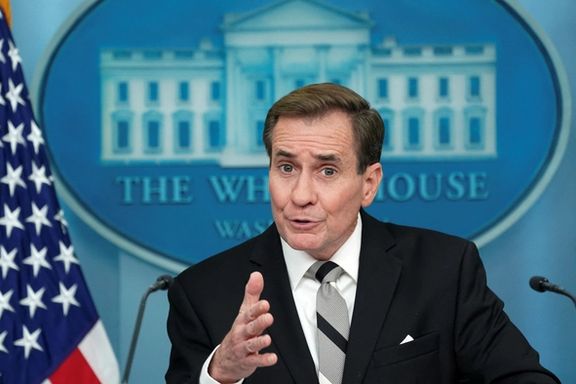
The Biden administration has been trying to avoid conflict with Iran ever since Hamas forces attacked Israel, fearing that the war on Gaza could expand and set the whole region ablaze.
A Politico report Wednesday suggested that senior Biden administration officials were against targeting Houthis for now, despite the marked increase in Houthi activities in the Red sea, which has forced two US warships to engage militarily.
On Wednesday, the USS Mason intercepted and shot down a drone launched from a Houthi-controlled area. Three days earlier, USS Carney shot down three drones after it received distress calls from vessels that had come under attack from Iran-backed Houthis in the Red Sea.
The Houthis say their attacks are in response to the Israeli onslaught on Gaza, which began after Hamas rampaged Israel on 7 October, killing a thousand people.
On Thursday, the US treasury sanctioned 13 people and entities over claims they provided “tens of millions of dollars” in Iran-linked funds to Houthi rebels in Yemen.
“The Houthis continue to receive funding and support from Iran,” the under secretary of the Treasury for terrorism Brian Nelson said. “Treasury will continue to disrupt the financial facilitation and procurement networks that enable these destabilizing activities.”
Iran of course denies involvement in the missile and drone attacks by the Houthis on Israel and vessels in the Red Sea. The official line from the regime spokespersons is that militant groups linked with Tehran act independently.
Earlier in the week, a senior adviser to Ali Khamenei said the same about Hamas – that the group had the means necessary to plan and execute operations, notwithstanding the fact, he suggested, that Iran would help the group militarily if it had access to Gaza Strip.
Asked about the future of the conflict and the hopes for a two state solution between Israel and the Palestinians, Kamal Kharrazi told Aljazeera, “this is their own business, of course. We have our own positions but we’re not going to dictate our positions to others.”
The former foreign minister of the Islamic Republic reiterated, however, that the regime didn’t “believe in” a two state solution. “Israel itself is not supporting this plan… and it’s not practical,” Kharrazi said, “We believe the final solution must be one state, composed of Muslims, Christians and Jews.”
The Islamic Republic has for long maintained this ambiguous, sit-on-the-fence politics, sending mixed messages on their intentions and their actions. In recent years, this has been largely helped by the Biden administration’s leniency, which many in Washington say has emboldened the regime and its proxies in the region.
“It [is] President Biden who refuses to respond to the recent attacks on American troops by Iran in Syria, in Iraq, in the Red Sea,” Senator John Kennedy told Fox News Thursday.
“The sad reality is that our enemies - China, Russia, North Korea, Iran - are not scared of President Biden. And for good reason," he said. “The Biden administration would rather debate whether man can breastfeed than protect the interests of this country.”
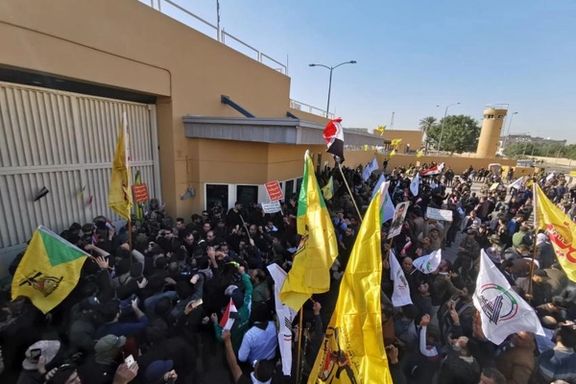
A US military official told Iran International that on Friday, a multi-rocket attack was launched at US forces in the vicinity of Union III and the Baghdad Embassy Complex.
The official also said that no casualties and no damage to infrastructure was reported. Earlier, Al Mayadeen television affiliated with the Iranian government reported attacks on Baghdad's Green Zone, where the US embassy is located.
Explosions were heard near the US embassy in Baghdad's heavily fortified Green Zone early on Friday, according to social media videos verified by Reuters.
Embassy spokespeople did not immediately respond to requests for comment when contacted by Reuters and there has been no official US announcement yet. Social media reports also said sirens calling on people to "duck and cover" were activated.
It was not immediately clear whether the embassy's air defense systems were activated or whether there was damage.
US forces at military bases in Iraq and Syria have faced more than 70 attacks since mid-October claimed by an Iran-backed umbrella organization of Iraqi Shi'ite Muslim armed groups, though diplomatic missions have been spared. The US military has retaliated against militant targets on a few occasions.
Yemen’s Houthis, backed by Tehran, have also launched attacks on commercial shipping and US naval vessels in the Red Sea in the past two weeks. The US this week accused Iran of involvement in assisting the Houthi drone and missile attacks.
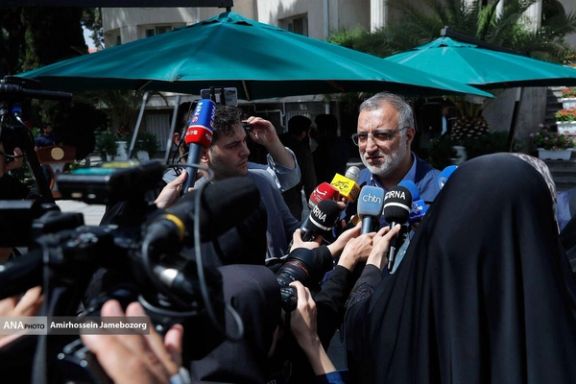
A member of the Tehran City Council made accusations this week that 170 trillion rials, or $336 million of Tehran Municipality's collected revenues are missing.
Habib Kashani, who is also a member of the Tehran City Council's Transparency Committee, told reporters in Tehran that the Municipality’s total revenues were 800 trillion rials last year, out of which some 520 trillion rials have been spent but over 170 trillion rials are missing. This includes urban advertising revenues.
The official called on the Iranian capital's Mayor Alireza Zakani to declare what happened to such a large amount of money, at a time when the Iranian government faces a significant budget deficit. Zakani is a top hardliner, who promotes himself as a committed revolutionary.
The news came as another suspected corruption scandal broke out, with a company allegedly misusing around $3.5 billion of foreign currency obtained from the government.
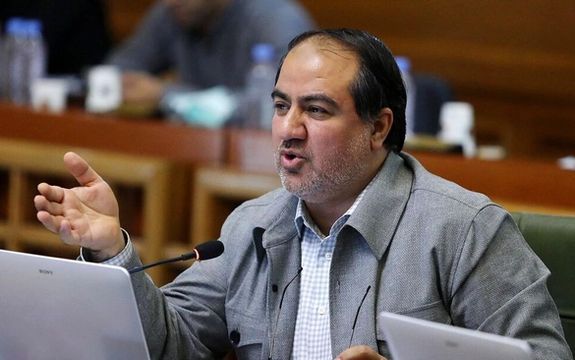
Meanwhile, Ahmad Sadeghi, another city councilor, has said that the itemized list of the municipality’s revenues needs to be verified by experts. In another development, Naser Amani, the councilor in charge of planning and budget expressed appreciation for Zamani’s effort to collect more than 84 percent of the sums due to the municipality during the past year. This means that there are still more revenues to be cashed.
The reports by councilors on the financial situation of the Tehran Municipality are riddled with conflicting and confusing figures that create more questions than they answer.
However, the financial issue was not the only embarrassment for Zakani this week. Social media reports said that the mayor has recently married his second, some say his third, wife. His daughter has been quoted as saying that his first wife has divorced the mayor after she found out that he has recently married the sister of a man who was reportedly killed by protesters in Karaj near Tehran, last year.
Social media users had previously said that Zakani has a wife in Tehran and another one in Qom, as is customary for religious men who spend their time in two different cities. Some users joked that he needed the third wife for the road between Tehran and Qom.
Some social media users on the other hand called for respect for the mayor's privacy, reminding that Islam allows men to marry up to four wives. In the Iranian Shiite sect, men can also get married to more than four women on temporary marriage contracts, taking advantage of a religious formula called "Sigheh".
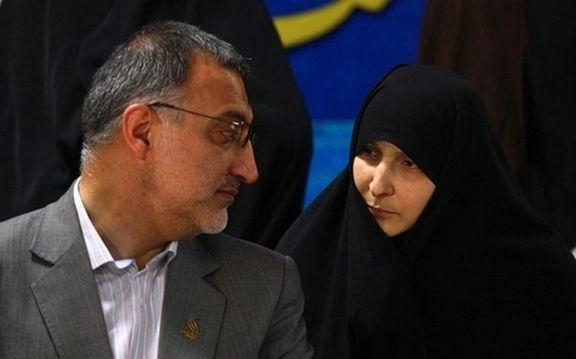
Zakani's first wife, Massoumeh Pakatchi, is in charge of the seminaries for female clerics in Tehran.
Others, including journalist Behnam Gholipour expressed concern that the scandal might affect Zakani's career as a politician and mayor because Supreme Leader Ali Khamenei is against polygamy by officials. He wrote that Khamenei has previously dismissed Basij Commander Alireza Afshar after he found out that the IRGC officer had two wives.
Some sources have said that Iranian reformists are taking revenge on Zakani for Iranian conservatives fanning the rumor mill in Tehran after one of the city's previous mayors, Mohammad Ali Najafi killed his second wife in 2019.
Still other social media users who apparently subscribe to conspiracy theories have said that there must be something bigger going on in Iran and the government is trying to conceal it by a mixture of news and rumors about big financial scandals including the $3.5 billion tea import case and the lost funds at the Tehran Municipality and more attractive reports about Zakani's wives and the arrest of a controversial rapper deported from Turkey.
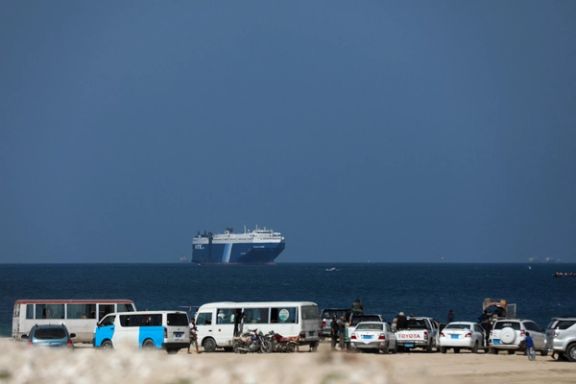
The US Department of Treasury slapped sanctions against 13 individuals and entities over their role in financing Iran-backed Houthis in Yemen.
The involved individuals and firms were “responsible for providing tens of millions of dollars’ worth of foreign currency generated from the sale and shipment of Iranian commodities” to Yemeni Houthis, the US Department of Treasury announced in a statement on Thursday.
Supported by the IRGC extraterritorial Quds force, the financing system operated through “a complex network of exchange houses and companies in multiple jurisdictions,” the statement added.
The Department of Treasury identified the mastermind behind this complicated network as Sa’id al-Jamal who served as the financial facilitator for Houthis and IRGC Quds force.
Washington said the sanctions target “an important conduit through which Iranian money reaches the country’s militant partners in Yemen.”
Though the Islamic Republic has avoided any direct military involvement in the Israel-Hamas conflict, the regime has used its allies such as Houthis and Hezbollah to attack Israeli and American targets in the region.
Houthis have intensified their attacks since the truce agreement between Israel and Hamas collapsed on December 1. On Sunday, an American warship and multiple commercial ships came under attack in the Red Sea.
“The Houthis continue to receive funding and support from Iran, and the result is unsurprising: unprovoked attacks on civilian infrastructure and commercial shipping, disrupting maritime security and threatening international commercial trade,” Brian E. Nelson, Under Secretary of the Treasury for Terrorism and Financial Intelligence, stressed.
Though US warships have intercepted most of the missiles and drones launched by Houthis of Yemen, the Biden administration is receiving more and more criticism over its failure to deter Iran and its proxies in the Middle East.
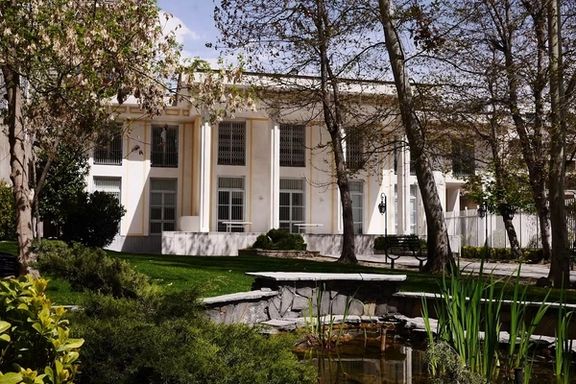
A series of mysterious events have impacted the Swiss embassy in Tehran, including a military attaché seriously injured and an employee's deadly fall from a balcony.
Switzerland's foreign ministry spokesman Pierre-Alain Eltschinger told Iran International on Wednesday that “the Federal Department of Foreign Affairs [FDFA] confirms three accidents or security incidents which occurred in Iran between May 2021 and September 2023.”
Switzerland represents US interests in Iran since Washington and Tehran cut ties shortly after the 1979 Islamic Revolution. The Swiss embassy in Tehran has been consistently relaying diplomatic communications between the Islamic Republic and the United States.
The spokesman added that “based on the facts currently known, the FDFA sees no connection between these incidents,” stating that “The cases are being or have been investigated.”
The most recent "incident” was in September, when a Swiss visa service employee was assaulted in the street on his way to work. He was attacked with a knife and was also shot in the hand. “He was very lucky,” said the diplomat’s entourage. Iran’s foreign ministry confirmed the “incident in which an employee of the Swiss embassy in Tehran suffered an injury to his hand.”
Another unexplained case happened in June, when a Swiss military attaché was found with “moderately serious” injuries in a hotel room in Tehran. According to information from CH Media, the Swiss colonel had significant injuries to his head, both knees as well as his chest and stomach.

In July, a Swiss army spokeswoman told CH Media, “He had a seizure in his hotel room, fell and suffered a head injury. From June 11 to 15, he was treated in a hospital in Tehran then repatriated to Switzerland on the orders of the doctor at the Swiss embassy. He is fine." At the time of the incident, the unnamed military attaché was stationed in Islamabad but apparently “accredited to Iran” and on a business trip.
The most tragic incident took place on the night of May 4, 2021, when a Swiss diplomat fell from the balcony of her apartment located on the 17th floor of a skyscraper in Kamranieh, a northern district of Tehran. Sylvie Brunner's body was discovered at the foot of the tower block by a gardener eight hours later.
The 52-year-old woman was the first secretary at the Swiss embassy and the head of the department that represents American interests in Iran, leading to curious speculations. Suspicions naturally arise when high-profile people or those engaged in sensitive work fall out of a window, as was the case with Egyptian billionaire spy Ashraf Marwan, who fell out of his London apartment in 2007.
“Suicide is not a possibility,” Tehran's emergency services said at the time of Brunner's death. “Specialized police units are in the process of examining” the circumstances around the death of the “52-year-old Swiss citizen employed by the Swiss embassy in Tehran”, the national police said in a brief online statement.
The Swiss foreign ministry expressed “dismay,” with diplomats saying the affair was “hushed up” internally. "The FDFA confirms that a Swiss employee of the Swiss Embassy in Tehran died in a fatal accident on Tuesday. The FDFA and its head Federal Councilor Ignazio Cassis are shocked by the tragic death and express their deepest condolences to the family," read a statement.
Eltschinger also told Iran International that “all Swiss representations abroad have a security concept in place to protect the infrastructure and embassy staff, which is reviewed continuously and adapted as necessary.” “If a security incident nevertheless occurs, the FDFA will initiate the clarifications necessary and, if required, take additional security measures. All employees are also regularly trained and sensitized with regard to security,” he added.
In 2016, US and Canadian embassy staff in the Cuban capital Havana started reporting a cluster of idiopathic symptoms that came to be known as “the Havana syndrome.” A US academic study found brain abnormalities in US diplomats who worked in Cuba, amid accusations that Cuba carried out "sonic attacks." Starting in 2017, an increasing number of individuals, including US intelligence and military personnel along with their families, began reporting similar symptoms in other locations, including China, India, Europe, and Washington DC.
In January 2022, the CIA issued an assessment concluding that the syndrome is not the result of "a sustained global campaign by a hostile power.” Whether the Swiss intelligence community will release a similar statement, clearing Iran as a hospitable host country for its diplomatic mission, remains to be seen.